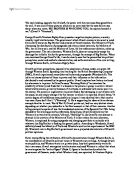Soon after Orwell had reached the front, he was shot through the neck. When Orwell returned to Barcelona three months later with the his branch of the militia known as the P.O.U.M., he described it as stepping into “an atmosphere that was scarcely less alien and hostile to us and our kind than if this had been Paris or London.” While Orwell had been away, the atmosphere of the city had lost the egalitarianism and working-class control it once had. Orwell blamed this change in attitude partially on Barcelona’s remoteness from the actual fighting, as well as the split of society back into its normal divisions (ex. rich and poor, upper and lower classes).
When the war had first broken out, militias had formed mainly because the working class felt “themselves to be fighting for working-class control”. He goes on to say that this was beginning to look increasingly like a lost cause, and that the people seemed to just want the war to end regardless of the result. The new Popular army had taken control as well, and with it, a new social order among the officers. The officers had better uniforms, better pay, and pistols, which Orwell declared the militia “could not get for love or money.” On top of the change in the public of Barcelona, Orwell also had to deal with the change in political nature against the P.O.U.M. and toward the Popular army. The Popular army was now hunting the P.O.U.M. members for being allies of the fascists.
Despite the tensions between the militia and the army, Orwell still has faith in and respect for the Spanish people. Orwell gives an account of an instance where he must retrieve a letter from the police department. He goes to a Popular Army officer to receive help. When the officer got the letter, he shook hands with Orwell. Orwell describes this moment as “a strange and moving thing.” All of the propaganda of the time was treating all members of the P.O.U.M. as fascist spies, and this soldier was shaking hands with the enemy. Orwell calls instances like this “typical of Spain-of the flashes of magnanimity that you get from the Spaniards in the worst of circumstances.” He says at a later point in the book that the generous nature of the Spanish “makes one hope that in Spain even fascism may take a comparatively loose and bearable form.”
All of the occurrences described in this essay help contribute to Orwell’s newfound patriotism when he returned to England. When Orwell wrote England, Your England, the British had just entered World War II, and Orwell had just returned from Spain. While in Spain, Orwell had seen how socialism, at least in the early stages, could be successful. He had also seen how it could fail. Orwell was a democratic socialist all his life, but seeing socialism fail in Spain may have contributed toward his acceptance of British policy during the early war period.
Another thing that must be considered is that British policy had also become more inline with Orwell’s own views. He had seen fascist regimes come to power in countries such as Germany and Italy. Orwell had gone to Spain to fight fascism, and now Britain was doing the same against Germany. A takeover from a totalitarian regime seemed improbable in England to Orwell because the British are unable to accept a change in ideas. While this backward mentality may slow progress, Orwell also saw it as a protection against both Nazism and fascism because the English could not understand these ways of thinking. As long as they did not understand these ideas, the principles posed no threat of taking over.
Seeing the Spanish divided into so many political factions to fight the fascists so ineffectually must have contributed to Orwell’s admiration of the British ability to suddenly swing together “like a herd of cattle facing a wolf.” In Spain, the divisions between the sides fighting the fascists were just as hostile toward each other as they were toward the true enemy. All the differences that existed among the British people seemed to lose importance when the country was confronted by an outside force.
The affection Orwell developed for the Spanish people may have played a part in Orwell’s new found love of his countrymen. Orwell had always been very critical of the English in the past, but in England, Your England, he took a very forgiving attitude toward the British for all their faults. All of the traits that may have been seen as faults to him in the past were now seen as virtues, such as their hatred of war, anti-intellectualism, and conformity.
Possibly the most important thing contributing to Orwell’s changed attitude could be the homesickness anyone would feel after being in a foreign country for an extended period of time. At the end of Homage to Catalonia, Orwell describes an English countryside as “the sleekest landscape in the world. It is difficult when you pass that way…to believe that anything is happening anywhere”. A major theme in England, Your England is the traits that the English share with no one else. English people have a language, customs, and general characteristics in common with no European country. After a time in Spain, Orwell was probably glad to return to the comforts of home.
One of best analogies Orwell gives for England is that of a Victorian family with “not to many black sheep but its cupboards bursting with skeletons.” The young are not taken seriously, and the power is in the wrong hands, but it is still a family. “It has a private language and its common memories, and at the approach of an enemy it closes its rank.” While not quite patriotic, this parallel is definitely more loyal than the typical Orwell writing. While bombs were falling in Orwell’s home, siding with his “family” may have seemed more important to him than any differences that existed among them.







